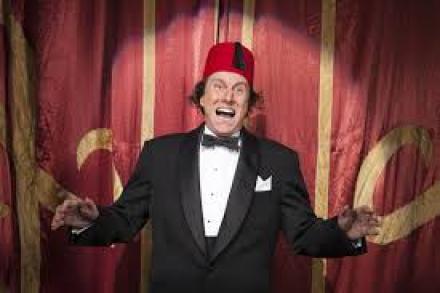
I'm really looking forward to Not Like That, Like This on Monday. I wrote about the subject of the drama, Tommy Cooper, in Beyond A Joke, my study of comedy's flawed heroes. As I discovered during my research, there was a lot more to Cooper than the Fez-wearing funnyman who was up there with Eric Morecambe when it came to family entertainers. It will be interesting to see how the drama, written by Simon Nye and starring David Threlfall (pictured) differs from my version of the story below. I expect there will be some overlap as Nye's script is based on John Fisher's Cooper biography, Always Leave Them Laughing and I also found Fisher's book very informative when I was delving into Cooper's dark side.
The Windmill Theatre gave showbiz breaks to all sorts. World War II had shaken everything up. The absurdity and horrors of war left a generation of performers with a sense of infinite possibilities. Anything could happen now. Comedy had a new irreverent streak and a lack of respect for authority. This made for great ground-breaking comedy, but at the same time it produced more comedians than ever who had a dark side. It is worth noting that Morecambe and Wise, an act without any discernible shadow, were just that little bit too young to see active service in the war. This may be the reason for their Bring Me Sunshine-y disposition. It might also be the reason why they did not fit in with the spirit of the Windmill and didn’t complete their booking there.
Some graduates of the theatre of war would fall victim to the psychological fallout. Some would come through it. And some would look as if they had overcome the trauma only for it to enter in the final act with a vengeance. Tommy Cooper, that beloved gentle giant of family entertainment, falls into this final category. It is perhaps no coincidence that his most famous onstage routine involved producing endless bottles of spirits as if from nowhere. By the end of his career Cooper was producing endless bottles of spirits offstage as well.
Thomas Frederick Cooper, born on 19 March 1921 in Caerphilly, Wales, was not born big. In fact the midwife said he was a weakling, and his mother had to give him nips of brandy to keep him going. It certainly did the trick – he was eventually well over six feet tall. And maybe those drops of alcohol gave him an early taste that would blossom into that bottle-a-day regime.
Eventually the family moved to Exeter, where his father had an ice-cream van. Like many entertainers, Cooper was shy offstage. If he was known among his school chums at all, it was for his interest in magic. Before he was ten he had his first magic set. He would do tricks in private and when he had perfected them set up shows for his friends. It would take time, however, for Cooper to realise that his skill was not so much in sleight of hand but the natural gift for clowning, which had always been there but took time to break through. His sheer physicality was funny, giving him a head start – lantern jaw, broad shoulders, six foot three and a half inches of lumbering lunacy.
During the war Cooper was in the army, joining the Household Cavalry, rising to the rank of Corporal of Horse and developing the onstage style that would serve him so well. It was while entertaining the troops in Egypt as part of the Combined Services Entertainment Unit that he reputedly grabbed a fez from a passing waiter and donned it. His act might not have been complete but his look was. Soon after the war, while he was still in the Middle East, he met Gwen. After a two- week courtship they were married, and Tommy and ‘Dove’ would remain together until he died. For a while they were also a professional double act, but it was clear that it was going nowhere and Tommy had to branch out alone doing what he called ‘cod magic and comedy’.
The late 1940s were a tough time. There was still rationing and it was hard to make an honest living. Tommy came up with some ingenious ways to supplement his income. With a friend he pretended they had hot tips for races, selling them for two shillings a time. They collected the money from workers on their way home with bulging pay packets and fled before the results came in. It all went well until Cooper was recognised due to an early TV appearance, and he had to steer clear of some areas for a while. But stage work was picking up. He had an agent, Miff Ferrie, and soon he could concentrate on comedy not conning. Ferrie was not a great judge of comedy, but he was good at doing a deal, whether for Tommy or for himself. Cooper would often moan about the tight contract that Ferrie held him to, but Cooper’s assiduous biographer John Fisher, suggests that this might just have been a way for him to cover up his own parsimony, pleading poverty when rounds of drinks were being bought. In fairness cash was tight everywherein those years. People quickly got into the habit of not spending money unless absolutely necessary. The most famous, possibly apocryphal story, is of him catching a taxi and putting something in the driver’s pocket as he got out saying ‘have a drink on me’. When the driver looked there was no tip, just a tea bag.
Click "next" below on the right to read more.



